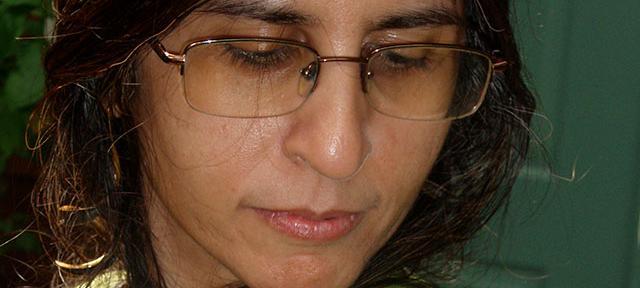Fiction Professor Uzma Aslam Khan on How Teaching and Writing Interconnect as a “Living Practice”

For award-winning author and Associate Professor of Fiction Writing Uzma Aslam Khan, focusing on language while also opening up the writing classroom to other disciplines is at the core of her teaching practice.
We sat down with Khan (virtually) to discuss her favorite classes, why Hampshire is so special, and her newest novel, The Miraculous True History of Nomi Ali.
What are some of the classes you teach? Do you have a favorite?
Birds With Big Noses: Creative Writing For Nature Lovers; Primacy of Character in Historical Fiction; Reading and Creating Comics; Art and the Political Imagination; Structure and the Story, and many others. I love them all!
What do you like best about teaching Hampshire students?
I can bring many disciplines to my creative writing courses at Hampshire: history, science, environmental justice, racial justice, visual arts, and more. At the same time, I also center close and loving attention to language, and how we work it as makers of art. All of this means that my teaching and writing are intimately connected. It means I am always learning, always in living practice.
Have you held any other professions before or during your time at Hampshire? And if so, have they informed your work?
Several. I've washed dishes, been a bartender. I'm a certified mixologist, and can concoct some pretty nifty drinks. I've also had many other teaching jobs, including teaching English as a second language in Rabat, Morocco; teaching creative writing workshops to women from across Pakistan's four provinces, as well as to Youth Initiative for Peace (a South Asian peace group); teaching children from grades 1-4 just about everything, including soccer. I taught in Hawaii for four years before coming to Hampshire. My very first teaching job, when I was around 17, was as an assistant to my art teacher in Karachi. She hired me to run a Saturday painting class for children in grade 1, and even younger. The children showed me color as radiant, alive.
Have you worked on collaborative projects with students?
Many times, and so happily. For instance, in fall 2015, with the help of colleagues as well as students, I was able to bring internationally renowned comics journalist Joe Sacco to be our writer in residence. Three of my creative writing students organized lunches with him, and also hosted a dinner and talk in support of a humanitarian cookbook project, Soup for Syria, to benefit Syrian refugees. The students made dishes from the cookbook and spoke so movingly about their experience combining cooking with making sense of the devastating crisis. In 2018, when I invited James Baldwin's nephew Daniel Baldwin to speak here, it was through working collaboratively with students that we were able to have such a terrific turnout. My students have also been great at organizing Division III creative writing readings.
What work have you been working on?
I recently published a fifth novel, The Miraculous True History of Nomi Ali, in India and Pakistan. [In the Fall, it won the UBL 2020 English Fiction award, and this March won the 2021 Karachi Literature Festival-Getz Pharma Best Fiction award.] It will be out in the U.S. next year, as well as in the U.K. and Sweden. Set in the Andaman Islands preceding and during World War II, it took me over 26 years to complete. For more on this long journey, see my piece in Punch Magazine.
I also recently published shorter works, including a story set during the lockdown called "Now Pray: Notes on a Separation" in AGNI 92 and another called "The Origin of Sweetness" for Desi Delicacies, an anthology of food writing from Muslim South Asia. Earlier in 2020, "My Mother is a Lunar Crater" was published in Calyx, and "Plum Island," which won a fiction contest (the judge was Tommy Orange!), was released in a special online winter issue of Zoetrope: All Story.
What do you hope future Hampshire students come to Hampshire prepared to do/be/see/experience?
I hope that the inclusion of stories beyond a U.S.-centric imagination will become increasingly normalized and that students will be eager to forge vital connections across cultures and continents, through empathy and inquiry. There are students who are already engaged in this way, which I find to be so grounding, so inspiring.



